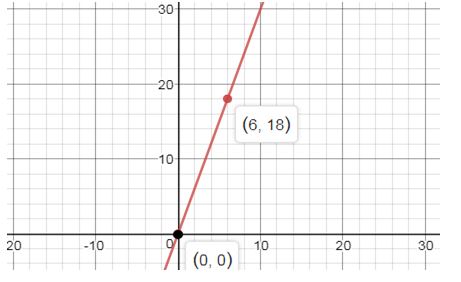
To solve: The function is defined on the interval ,
a. Graph .
In (b)–(e), approximate the area under from 0 to 6 as follows:
Answer to Problem 9AYU
Solution:
a.

Explanation of Solution
Given:
The function is defined on the interval .
Calculation:
; ; ; ; ; ;
a. Graph .

To solve: The function is defined on the interval ,
b. Partition into three subintervals of equal length and choose as the left endpoint of each subinterval.
Answer to Problem 9AYU
Solution:
b. 36
Explanation of Solution
Given:
The function is defined on the interval .
Calculation:
; ; ; ; ; ;
b. Partition into three subintervals of equal length 2 and choose as the left endpoint of each subinterval.
The area is approximated as
To solve: The function is defined on the interval ,
c. Partition into three subintervals of equal length and choose as the right endpoint of each subinterval.
Answer to Problem 9AYU
Solution:
c. 72
Explanation of Solution
Given:
The function is defined on the interval .
Calculation:
; ; ; ; ; ;
c. Partition into three subintervals of equal length 2 and choose as the right endpoint of each subinterval.
The area is approximated as
To solve: The function is defined on the interval ,
d. Partition into six subintervals of equal length and choose as the left endpoint of each subinterval.
Answer to Problem 9AYU
Solution:
d. 45
Explanation of Solution
Given:
The function is defined on the interval .
Calculation:
; ; ; ; ; ;
d. Partition into six subintervals of equal length 1 and choose as the left endpoint of each subinterval.
The area is approximated as
To solve: The function is defined on the interval ,
e. Partition into six subintervals of equal length and choose as the right endpoint of each subinterval.
Answer to Problem 9AYU
Solution:
e. 63
Explanation of Solution
Given:
The function is defined on the interval .
Calculation:
; ; ; ; ; ;
e. Partition into six subintervals of equal length 1 and choose as the right endpoint of each subinterval.
The area is approximated as
To solve: The function is defined on the interval ,
f. What is the actual area ?
Answer to Problem 9AYU
Solution:
f. 54
Explanation of Solution
Given:
The function is defined on the interval .
Calculation:
; ; ; ; ; ;
f. The actual area under the graph of from 0 to 6 is the area of a right triangle whose base is of length 6 and whose height is 18. The actual area is
Therefore
Chapter 14 Solutions
Precalculus
Additional Math Textbook Solutions
Thomas' Calculus: Early Transcendentals (14th Edition)
University Calculus: Early Transcendentals (4th Edition)
Calculus and Its Applications (11th Edition)
Precalculus: Concepts Through Functions, A Unit Circle Approach to Trigonometry (4th Edition)
 Calculus: Early TranscendentalsCalculusISBN:9781285741550Author:James StewartPublisher:Cengage Learning
Calculus: Early TranscendentalsCalculusISBN:9781285741550Author:James StewartPublisher:Cengage Learning Thomas' Calculus (14th Edition)CalculusISBN:9780134438986Author:Joel R. Hass, Christopher E. Heil, Maurice D. WeirPublisher:PEARSON
Thomas' Calculus (14th Edition)CalculusISBN:9780134438986Author:Joel R. Hass, Christopher E. Heil, Maurice D. WeirPublisher:PEARSON Calculus: Early Transcendentals (3rd Edition)CalculusISBN:9780134763644Author:William L. Briggs, Lyle Cochran, Bernard Gillett, Eric SchulzPublisher:PEARSON
Calculus: Early Transcendentals (3rd Edition)CalculusISBN:9780134763644Author:William L. Briggs, Lyle Cochran, Bernard Gillett, Eric SchulzPublisher:PEARSON Calculus: Early TranscendentalsCalculusISBN:9781319050740Author:Jon Rogawski, Colin Adams, Robert FranzosaPublisher:W. H. Freeman
Calculus: Early TranscendentalsCalculusISBN:9781319050740Author:Jon Rogawski, Colin Adams, Robert FranzosaPublisher:W. H. Freeman
 Calculus: Early Transcendental FunctionsCalculusISBN:9781337552516Author:Ron Larson, Bruce H. EdwardsPublisher:Cengage Learning
Calculus: Early Transcendental FunctionsCalculusISBN:9781337552516Author:Ron Larson, Bruce H. EdwardsPublisher:Cengage Learning





